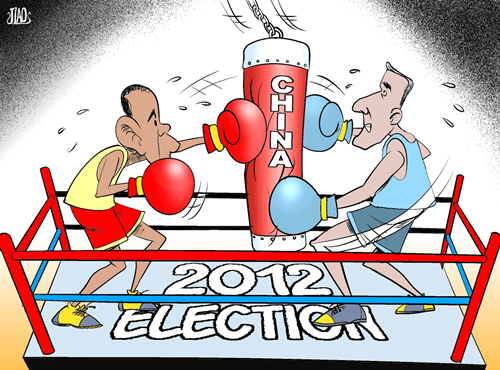Obama, Romney talk tough on China to lure voters
- By Wei Hongxia
 0 Comment(s)
0 Comment(s) Print
Print E-mail China.org.cn, September 22, 2012
E-mail China.org.cn, September 22, 2012
People once thought that the major factor in the 2012 US presidential election would once again be about the economy. Obama and Romney, they argued, would spend most of their campaigning time arguing about the economy, the job market and healthcare reform. The addition and subtraction of certain policies by either candidate if elected, they believed, would improve the American economy and social welfare in the US.
|
|
|
Economic punching bag [By Jiao Haiyang/China.org.cn] |
However, the recent wave of anti-American protests in the Middle East and the death of American diplomats in Libya have caused the 2012 campaign to change course, leading the two sides into a vigorous debate about foreign policies. Americans found it very hard to understand how their diplomats got killed and fellow Americans were left in danger in the countries that they tried to help. The Republican and Democratic camps have both spent the weekend blasting each others' positions and fumbling to respond to attacks.
On Monday, China became a topic of argument for the two sides. Previously, Romney attacked Obama for being soft on China and handing American job opportunities to Chinese. On Monday, the Obama Administration filed a case against China to the World Trade Organization, alleging China is illegally subsidizing its car and auto-part exports. Some analysts said that this move would put the focus of the campaign back on the economy.
Comparing Obama's China track record and Romney's proposed policies regarding China, we are able to get a clearer picture of the American policy roadmap for US-China relations.
In the early stage of Obama's presidency, he actively sought cooperation with China, promoted US-China strategic and economic dialogues, and tried to deal with trade disputes and other problems. When Obama or American senators visited China or when American officials met with Chinese visiting leaders in the US, "cooperation" was the word often hanging on the lips of the American president and his administration.
But with the American trade deficits increasing, the Obama administration gradually lost its temper and bombarded the Chinese government over its alleged manipulation of the yuan. Meanwhile, American arms sales to Taiwan made China doubt America's sincerity to cooperate. Under these circumstances, the hope for redefining China-US relations was nearly lost. Next, there came America's seemingly grand "Pivot to Asia" strategy, which did not only exacerbate the strain of Sino-US ties but also remained controversial back in America. With this move, America further complicated the already tense situations in the South China Sea and the East China Sea.
Traditionally, the Democratic Party has tended to goad China on human rights. However, after Obama took office, the US kept quiet about this matter for a while. Some people even commented that America had begun to understand Chinese society after many years of communications and exchanges. Then, unexpectedly, blind activist Chen Guangcheng broke the calmness. Without investigating Chen's background, America once again carried the torch of human rights, and in doing so almost shot itself in the foot.
In a word, Obama's China policies have failed to win China's affection. Seemingly, Obama has created a lot of holes in his foreign policy for Romney to pick away at. However, Romney has not aimed to improve China-US relations by attacking Obama's China policies. Thus, it seems no presidential candidate has called for bettering the relationships with China during this election campaign.
In fact, Romney is no pioneer in this regard ― he holds an even tougher stance on dealing with China than Obama does. When he was bidding for the Republican nomination, he wrote an article published in The Washington Post attacking China's violation of other countries' intellectual rights. In another article for the Wall Street Journal, he said if elected, he would immediately confront China's alleged currency manipulation issue and advocate for a strong US military presence in the Pacific, deepening cooperation with India and other regional allies to help counter China's rise. Additionally, he promised a strong defense of human rights, and incentivizing China to pursue fair free trade policies.
Romney's proposals, however, are nothing new compared with Obama's current policies. Essentially, these promises are intended to lure American voters and do not mean much to China or other countries in East Asia. What matters - if he can beat Obama and win the American presidential election - is what he would do once he's sitting in the big chair.
The author is now a visiting scholar with the Carnegie Endowment for International Peace. She is a columnist with China.org.cn. For more information please visit: http://www.china.org.cn/opinion/weihongxia.htm
(This post was written in Chinese and translated by Pang Li)
Opinion articles reflect the views of their authors, not necessarily those of China.org.cn.







Go to Forum >>0 Comment(s)